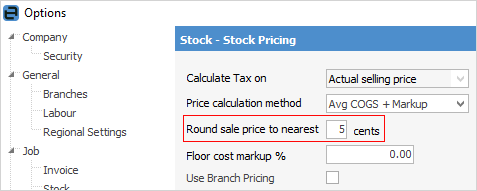
If you do not have Jim2 set up with the option to round to the nearest 5 cents, coin denominations may limit your ability to tender exact cash change in some circumstances.
Example: an invoice totals $19.98. The customer gives you $20 cash as payment, but you will not be able to give the customer the two cents cash change (although you could choose to give them a two cent credit for next time).
It is accepted retail practice to round the invoice total up or down to the nearest five cents for cash transactions. As such, Jim2 will automatically round the transaction according to the rules in the table below, and move the odd cents to your linked rounding (expense) account.
Invoice amount |
Jim2 rounding action for cash payments |
|---|---|
Invoice ends in 1 cent |
Automatically rounds the transaction down to end in 0 cents |
Invoice ends in 2 cents |
Automatically rounds the transaction down to end in 0 cents |
Invoice ends in 3 cents |
Automatically rounds the transaction up to end in 5 cents |
Invoice ends in 4 cents |
Automatically rounds the transaction up to end in 5 cents |
Invoice ends in 6 cents |
Automatically rounds the transaction down to end in 5 cents |
Invoice ends in 7 cents |
Automatically rounds the transaction down to end in 5 cents |
Invoice ends in 8 cents |
Automatically rounds the transaction up to end in 0 cents |
Invoice ends in 9 cents |
Automatically rounds the transaction up to end in 0 cents |
This rounding does not affect the invoice total (or debtor records), and does not take place for other payment types – only for cash.
 |
To set your default rounding, on the ribbon, go to Tools > Options > Stock Pricing and enter your required default, eg. to nearest five (5) cents.
 |
Further information: